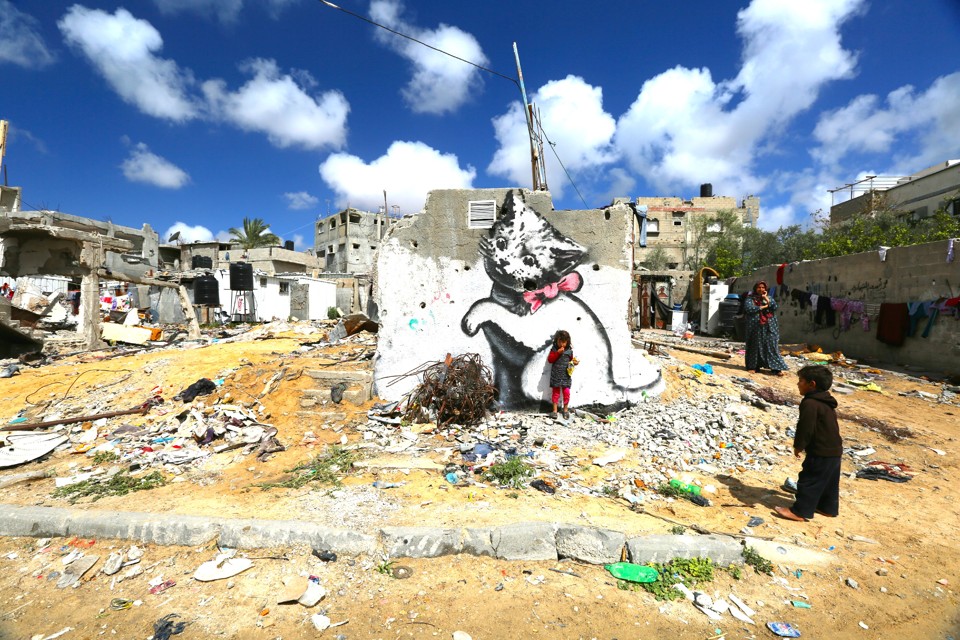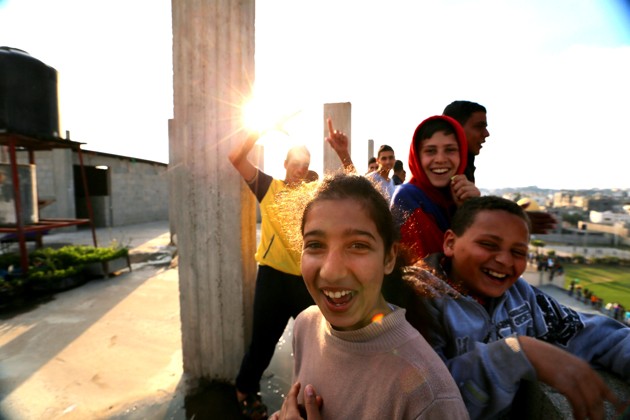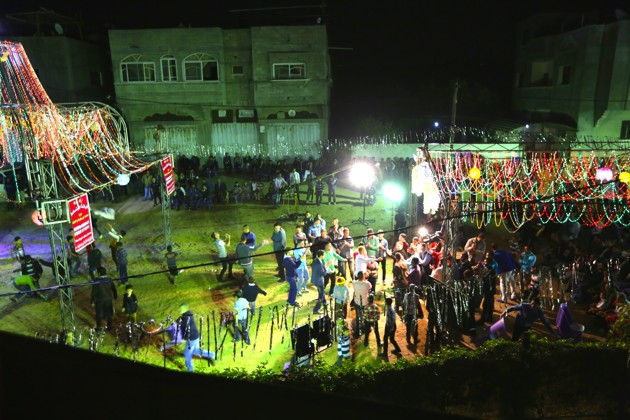Desolation and destiny in a land in limbo
 Banksy artwork on the ruins of a building destroyed by Israeli bombardment in Beit Hanoun (Alice Su)
Banksy artwork on the ruins of a building destroyed by Israeli bombardment in Beit Hanoun (Alice Su)
Alice Su, The Atlantic, May 2, 2015
BEIT HANOUN, Gaza Strip—Eight months after last summer’s war between Israel and Palestinian militant groups, Gaza remains in ruins. Drive five minutes into the territory from the crossing point in southwestern Israel and you reach Beit Hanoun, one of the areas hit most severely by land and air during the conflict. Bright blue sky spreads over buildings with big bites taken out of them. Half-eaten bedrooms and kitchens yawn open to reveal tangled wires, broken rock, and household goods: a slipper, a pack of sanitary pads, a ripped-up schoolbook. People peek over mounds of rubble from tents behind their former homes, like aliens come to settle an abandoned planet.
In Gaza City, the flags and slogans of Hamas, the Islamic militant group that governs Gaza, cover the street corners: “Resist, O Palestinian people, your perseverance is our only hope for freedom.” Driving through the city, you see murals of doves and children holding hands, UNRWA cartoons about saving water and picking up trash, and then a stick figure blowing up an Israeli tank. Across the street, someone has scrawled a Star of David on a garbage bin.
But ask what people are doing, and they say, “Sitting. Waiting.” Hamas’s rhetoric is all about resistance, but most people I met in Gaza were not so much defiant as desolate, not so much resisting as resigned. Those who survived last summer’s war are trapped in 360 square kilometers of trauma and contradiction, choking on war and blockade, disillusioned with the Palestinian leadership and disempowered by the aid community. They sit without jobs, relief, or means of rebuilding, waiting for things to change.
“Gaza is hell,” 20-year-old Ahmad told me in Shejaiya, one of the worst-hit neighborhoods in Gaza City. He and his 19-year-old brother were picking over the leftovers of their home. Sometimes they sell salvaged iron and rubble for recycling; other days they search for their old photos, papers, and clothes. “Gazans have Israel on one side, Hamas on the other, and here we are just eating shit,” he said. “People are only living because they are not dying. If death was nicer, we’d go for it.”
Gaza, which was under Israeli occupation from 1967 until 2005, when Israeli troops and settlers withdrew from the territory unilaterally, has been overseen by Hamas since the organization defeated the PLO-affiliated Fatah party in Palestinian elections in 2006. Fighting broke out between Hamas and Fatah the following year, leaving Hamas running Gaza and Fatah running the West Bank. Israel responded by imposing a blockade on Gaza to deter Palestinian rocket attacks and other militant activity against Israeli civilians—forbidding all access by air and sea, controlling physical movement through its crossings, and placing restrictions on access to commercial goods as well basic supplies like fuel, electricity, food, and medicine. Israel has also launched three military operations in Gaza since the Hamas takeover, with the latest leaving 2,131 Palestinians and 71 Israelis dead. Almost 70 percent of the slain Palestinians were civilians, including at least 501 children.
“People are only living because they are not dying. If death was nicer, we’d go for it.”
“I don’t support any political party. But when Israel is killing us, Hamas is like our special ops. They’re the only ones doing anything to defend us,” a 21-year-old nursing student at the Islamic University in Gaza City told me.
Another college student said she’d lost faith in politics, but would vote for Hamas if an election were held now. Palestinian politicians are corrupt, she said, but she’d rather support Hamas than forego resistance altogether: “We know that if we stopped, Israel would wipe us all out. We are being crushed and crushed and crushed and crushed. So it’s either die for your cause or compromise, but you’ll be killed one way or another.”
Last June, Fatah, Hamas, and other factions formed a unity government, promising to hold presidential and parliamentary elections within six months. But then the war broke out. The window for elections has passed and the politicians are split over several issues. Some are ideological: Hamas advocates militant resistance to Israel while the Palestinian Authority (PA) in the West Bank prefers negotiation.
Others are bureaucratic, bordering on absurd. For example, some 70,000 PA employees in Gaza were ordered to stop working when Hamas came to power in 2007. Forty thousand of them still receive monthly salaries from Ramallah, the PA’s headquarters in the West Bank, even though they’re not working. Meanwhile, the 40,000 civil servants and security forces that Hamas has employed as replacements have been working for a year without salaries. Hamas wants the Palestinian Authority to pay these salaries but the PA has refused, arguing that many of Hamas’s employees are unqualified for their positions. Meanwhile, Ramallah imposes high taxes on Gaza’s fuel, imported to run the territory’s half-destroyed power plant, and uses some of that revenue to pay its employees in Gaza. These employees, in turn, sit at home in the dark, forbidden from working but also without electricity because the high cost and scarcity of fuel has choked Gaza’s energy supplies.
Across the Gaza Strip, I heard one word over and over: naseeb—Arabic for fate or destiny, one’s lot in life as determined by God.
 The thrills of a soccer match between teams from Beit Lahia and Jabalia refugee camp (Alice Su)
The thrills of a soccer match between teams from Beit Lahia and Jabalia refugee camp (Alice Su)
Naseeb, said 42-year-old Yehia Mahmoud, a former tuk tuk driver standing before the carcass of his family’s four-story house in Deir al-Balah, a refugee camp initially built to shelter 9,000 out of the 750,000 Palestinians who became refugees when Israel was established in 1948. More than half a century later, the camp hosts more than 21,000 refugees, their original tents replaced through the generations with mud-brick shelters, then cement-block structures, and then houses. Mahmoud’s was one of them, until last summer. Now he’s living in a temporary shelter, where his 10-year-old triplets, two boys and one girl, fantasize about seeking revenge against Israelis. They keep asking him why the Israelis bombed them. “I tell them, ‘Naseeb. This is our fate,’” Mahmoud said.
Naseeb, said 23-year-old Kamal Ayyad, whose mother and pregnant sister were killed by shelling last summer as they fled their home in Shejaiya. “I didn’t know until I was standing over their bodies at the morgue,” Ayyad said. “I saw my sister’s face, my mother’s scarf and ring.” His other sister still has shrapnel in her body but can’t get surgery to remove it in Gaza, where the war damaged or destroyed 45 ambulances, 50 primary-healthcare clinics, and 17 hospitals. Seeking surgery outside Gaza requires Israeli permission, which is only granted for “exceptional humanitarian cases.” Ayyad set his tea down, stared ahead, and blinked when I asked if he was angry. “Naseeb. This is our destiny.”
Naseeb, said 29-year-old Abu Khalid, a building engineer working on contract with the Housing Ministry in the southern town of Khuza’a. We sat in a tent with his neighbors behind their bombed neighborhood, a block of buildings twisted inside out, jutting toward the sky amid fields of yellow flowers. “The government is all talk,” Abu Khalid said. “Persevere, they say, but there’s no relief, no plan, and no income.”
Abu Emad, a 50-year-old lawyer, agreed. “Hamas is keeping the money for themselves. They are thieves, drug addicts, people who worked with donkeys and then became government officers. Hamas has closed everything against us,” he said.
The other men laughed. “Don’t take him seriously,” Abu Khalid said. “He’s taking corrupt money from Ramallah.” The lawyer had been a military general with the Palestinian Authority, one of the former Fatah employees taking a salary from Ramallah for doing nothing.
Who can push the factions to reconcile or hold the government accountable for its finances? I asked. The men shrugged. “This is our naseeb.”
Reconstruction requires two things, said Naji Sarhan, acting deputy minister at the Palestinian unity government’s Ministry of Public Works and Housing: money and materials. And Gaza has neither. International donors promised $3.5 billion for reconstruction efforts last October, but only 27 percent of those funds have materialized so far, according to a report in April by an association of aid groups. Disbursement is slow because of other regional crises, the report noted, but also because donors are put off by the political deadlock between Palestinian parties. Paradoxically, the lack of rebuilding deepens divisions between Gaza and the West Bank. Donors don’t give money because Palestinian reconciliation is at a standstill, but the longer Gaza goes without reconstruction funds, the worse the Palestinian political schism becomes.
What is Gaza’s naseeb? I asked.
They paused, then one answered: “Israel.”
Meanwhile, Israel has restricted imports of key building materials like cement and steel, out of concern that they’ll be used to build tunnels and facilitate terrorist activity. Gazans relied on materials from Egypt, smuggled through tunnels at the southern border, to rebuild after the last two wars with Israel. But this time the border is sealed, with Egyptian authorities also citing security and counterterrorism as a rationale. Based on the rate at which truckloads of construction materials have been allowed into Gaza, the relief organization Oxfam estimates that it will take more than 100 years to rebuild the area.
As a result of all this, none of the 19,000 homes destroyed in the war has been rebuilt, and 100,000 people out of Gaza’s 1.8-million population are still homeless. “People are suffering,” Sarhan said. “They are pressurized, living in a jail in the wreckage of their homes. If we don’t help them, they will explode, and they will explode against Israel.”
In Beit Lahia, a town just north of Gaza City, I met a group of unemployed men and asked them what Gazans want. “At least 12 hours of electricity,” 29-year-old Mohamed Kilani said, laughing. “People in Gaza are so happy,” he snorted. “Just give us an hour of electricity and we’re on top of the world.” Kilani studied law at Gaza’s Al-Azhar University, but hasn’t received a diploma because he can’t afford to pay off his tuition fees. His friend Ali, who studied mathematics at the Islamic University, got in on the joke. “Gaza is like heaven. There’s never any work!”
What is Gaza’s naseeb? I asked the men. They paused, then one answered: “Israel.” The oldest man present, Abu Ahmad, had lived through 1948 and 1967, two intifadas, and three wars. God damn the fathers of all the politicians, Abu Ahmad said, Israelis and Palestinians alike.
“Israel is a superpower. We can’t stand against them. We don’t have planes, tanks, or any weapons like theirs. All we have is humans.” Abu Ahmad said. Naseeb means that everything is from God, he explained, so you do what you can and leave the rest to Him. “We shouldn’t surrender. But we cannot always fight.”
The problem with Palestinians, Kilani interrupted, is their perseverance. “We can adapt to hell. People keep accommodating, but things are getting worse,” he said. “In the end, we are dead. There is no life.”
 A bachelor’s party in Beit Lahia (Alice Su)
A bachelor’s party in Beit Lahia (Alice Su)
In Gaza, life and death are written in sand. The longer you stay, the more the line between them blurs. April is wedding season: Newlyweds’ cars line the beach, festooned with flowers and heralded by frenzies of drums. Families stream to parties that drag into the night. They dance, ululating at the stars and the sea as if war never happened here—as if the strip isn’t choking on brackish water, its lights out and buildings destroyed, as if the guests’ pockets aren’t empty, as if the bride and groom won’t go home to jobless mornings and bare rooms bearing posters of martyred relatives.
One night, I stood on a roof with a bride’s aunts and sisters, watching a bachelor’s party below. The groom’s friends whooped as they carried him on their shoulders, sweating and whirling in celebration. Behind them, the town was drenched in darkness save three spots on the horizon: the fully lit buildings across the Israeli border, the field lights on a Hamas training camp, and above it all, a full moon.
“Come back. You won’t see the moon like this anywhere else,” one of the girls whispered to me. But not during the next war, she added. “That’s a bad time. Come after. We’ll be here.”